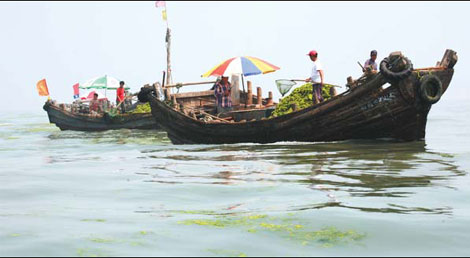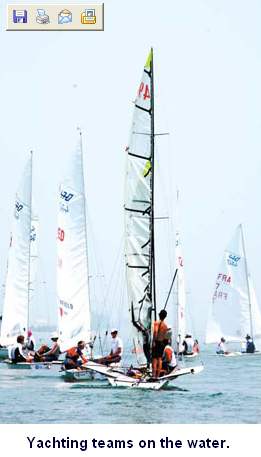The expanse of algae at Qingdao's Olympic sailing venue is decreasing due to intense efforts by local authorities.
"The area covered is much smaller than a few days ago. Only scattered coverage can be seen in the 50-sq-km competition area," Liu Kefu, deputy head of North Sea Branch of State Oceanic Administration of China told China Daily.

Algae floating in from the Yellow Sea has affected sailors' training since the middle of June.
After clearing efforts by locals, most yachting teams resumed training on Sunday. Sailors said they appreciate the efforts made by the local government.
"At the beginning (of the algae bloom) we had to clean the boat several times, but now it is OK," said competitor Livia Varejmaa of Finland. "I think locals have done a great job. We see many people collecting algae. I appreciate it very much."
"The guys are doing a great job," said Alvaro Marinffo, a sailor from Portugal. "The Olympics are coming soon and they are trying their best to clean up everything. I think it's much better than it was before. I'm confident that local government will clean up the algae before the Olympic sailing regatta."
"There is much less than a few days ago and we grab every minute to train. We are confident in 2008 Olympics," said Chinese Olympic competitor Song Xiaqun.
Local authorities have assigned more than 1,000 boats and organized locals and even the army to remove the green bloom.

In addition to fishing boats, modified large ships and landing ships, dredgers, and tugboats have also joined the cleaning force. Enormous pumps improve their efficiency.
Four large ships from the North China Sea fleet have been refitted with equipment that enables them to remove algae enclosed by 32 fishing boats in less than two hours.
A 32,000-m-long net was installed around the waters for the Olympic sailing competition to keep algae out.
As the main force to fight the bloom, the army stationed in Qingdao has dispatched more than 5,000 soldiers every day to join the cleanup.
More than 576,000 tons of algae had been cleared away by July 9, according to the latest news from the emergency department,
The Qingdao Olympic Sailing Committee has also set up a monitoring office to keep contact with every team on the water.
More than 300 athletes from 34 countries are now training for the competition in Qingdao.
Zhou Mingjiang, a researcher with the Institute of Oceanology at the Chinese Academy of Sciences, said that different from algae in Taihu Lake last summer - which forced local water plants to cut off drinking water to local residents - the bloom in Qingdao was not caused by pollution and won't affect the quality of Qingdao's drinking water.
The local government vowed to ensure a safe and clean venue for the Olympic regatta in August.
(China Daily July 11, 2008)